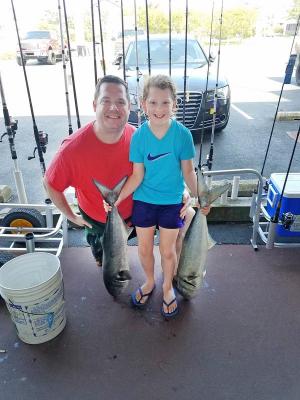Bluefish dominate the surf from South Bowers Beach to Fenwick Island. Choppers to 17 pounds have been caught up the Broadkill River as far as Oyster Rocks and inside Indian River Bay and Indian River Inlet. Cut bunker works best along the beach, while metal lures produce blues out of the inlet. The fishing pier at Cape Henlopen State Park and the beach to the east and west have been ground zero for the big blues. The best time to be there is on a flood tide. Along the surf, the best bite occurs at the top and the bottom of the tide.
More tog have been caught along the Outer Wall on green crabs. This is good news for small-boat operators who can’t reach the ocean wrecks and reefs. Please keep in mind that tog season will close Thursday, May 11, then reopen Monday, July 17.
Flounder action remains slow with a few keepers caught out of the Lewes-Rehoboth Canal and the VFW Slough in Indian River Bay. Live minnows, squid strips and Gulp! have been the best baits.
Black drum keep showing up at Broadkill Beach where they take clam baits. Drum have also been caught in lesser numbers along the ocean beaches on clams and cut bunker.
As their spawning cycle comes to an end, we should see more keeper rockfish along the surf and out of Indian River Inlet. The last report I had put a few rock to 30 inches caught from the inlet on bucktails at dawn, dusk and during night tides. One or two rock to 40 inches have been taken from the surf on cut bunker.
According to the long-range forecast, we are in for an extended period of 15- to 20-knot winds. This is going to stir up the water and make fishing difficult. All we can do is try to find a lee shore and keep on fishing.
Advisory council
On April 27, the Advisory Council on Recreational Fishing Funding met in Dover to review what has been done and plan future projects.
One disappointing bit of news for our artificial reef-building projects is the federal government will no longer allow the state to bank credits for matching in-kind donations. What that means is when someone donates material, such as old ships, concrete, building materials or whatever, we must use the total value of the donation within one year. Should the reef building cost less than the value of the donation, Delaware can no longer bank those funds to use as a match for federal funds further down the road.
On the plus side, we will be sinking the next ship on the Del-Jersey-Land reef as soon as we get a three-day weather window. Of course, the way the wind has been blowing, that may have to wait until August.
As for projects underway, the new ramps at Phillips Landing near Bethel can finally move forward. The problem was some Indian artifacts found at the site. The state had to determine if this was a significant find that would have to be preserved. Fortunately, it was not, but the time it took to do the research then apply for the permits held up this project. Barring future holdups, the ramps should be done by fall.
Millsboro Pond access is still in the planning stages. The state wants to add more parking, and we must conform to laws providing handicap access. The engineering plans are in the works, but it will still take more time to improve this popular fishing location.
The project to install LED lights at the Lewes Boat Ramp is moving forward. Once completed, they will provide a much brighter parking and launching area.
The tagging program is ready to go. As soon as the dates and locations for instructions to future recreational fish taggers is announced, I will post them here.
Finally, there are plans to repair 11 parking lots at boat ramps across the state. This will include filling potholes, restriping parking spaces and other general repairs.
The primary reason for the delay in most planned projects is the permitting system. You might think that when an agency of DNREC requires a permit from DNREC, the process might be fast-tracked. Not so. Fish and Wildlife has to apply for each and every permit the same as a private citizen. When problems are uncovered, like the Indian artifacts at Phillips Landing, the same slow investigation must be undertaken.
Then there is the Army Corps of Engineers. They have a very complicated permitting process, and since many of the projects Fish and Wildlife would like to do involve a Corps permit, that just adds to the delay.
























































